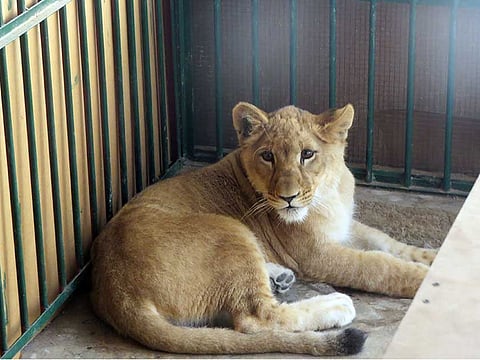You may be supporting drug dealers by buying exotic pets
Illegal trade in wildlife also linked to arms, drugs and human trafficking, says International Fund for Animal Welfare

Dubai: You may be unknowingly supporting trafficking in drugs and weapons if you buy exotic pets smuggled into the country, a top official has warned.
The term ‘exotic pets’ covers the practice of keeping wild animals as household pets as a status symbol. These animals include lions, tigers, cheetahs, reptiles and birds.
“This is really important for people to understand; the people trafficking wildlife are also trafficking other things like drugs or arms. In some cases, there is also human trafficking,” Azzedine Downes, president and CEO of the International Fund for Animal Welfare (IFAW), told Gulf News.
“This trafficking network doesn’t really care what product it’s selling. It only cares about the profit margin.”
Illegal trade in wildlife is among the largest sources of criminal earnings worldwide with $8-10 billion (Dh29.4 to Dh36.7 billion) in profits, which places it in the league of human trafficking, arms and drug dealing, according to 2014 figures from the UN Office on Drugs and Crime.
Often, profits in wildlife trade are used to finance further illegal activity, including transnational organised crime, according to the UN Environment Programme Yearbook 2014.
“It’s not as though poachers or traffickers in wildlife have anything against animals. They don’t. Wildlife is an easy product [to smuggle]. So it really doesn’t matter what the product being trafficked is. The criminal network is just the same,” Downes said.
In 2012, the Ministry of Environment and Water issued a decree banning the import of exotic animals for personal or commercial use.
UAE authorities that same year confiscated live and dead animals, even by-products of some animals such as baboons, an ostrich, boa constrictors, an American alligator, pythons, among others, based on the latest published figures from the UAE Convention on International Trade in Endangered Species of Wild Fauna and Flora.
But the issue of keeping exotic pets persists in the country, Downes said.
According to Dr Elsayed Ahmad Mohammad, Programme Director at Ifaw, the message is clear: If there is no demand, supply will eventually stop.
“If you buy, they will die. So if you are buying wild animals, you are encouraging poachers to bring more illegally trafficked animals — whether alive or dead.”
Sign up for the Daily Briefing
Get the latest news and updates straight to your inbox


